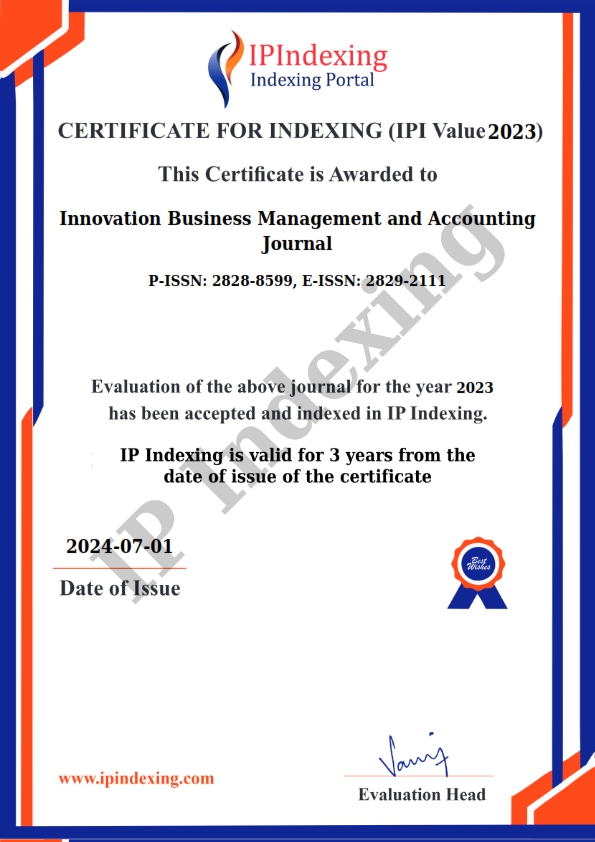Self Efficacy, Role Conflict, and Job Satisfaction: A Mediation Analysis of Job Participation in Tourism Village Development Volunteers
DOI:
https://doi.org/10.56070/ibmaj.2024.006Keywords:
Job Participation, Job Satisfaction, Role Conflict, Self-Efficacy, Tourism VillageAbstract
This study investigates the relationship between self-efficacy, role conflict, job participation, and job satisfaction in the context of tourism village development volunteers. It also investigates the moderating role of Job Participation on the relationship between self-efficacy, role conflict and ambiguity, and job satisfaction. Data was collected from 225 volunteers and tourism village development managers in Bojonegoro Regency. The findings show that self-efficacy is positively related to job participation, while role conflict has no effect on job participation. Self-efficacy and role conflict also have a positive effect on job satisfaction. With regard to the moderating role of job participation, the findings show that there is an indirect relationship between self-efficacy and job satisfaction that is stronger with job participation. Additionally, the results of this study suggest that self-efficacy plays a crucial role in motivating tourism village development volunteers to actively participate in their roles, contributing to their overall job satisfaction. Furthermore, the findings highlight the importance of addressing and managing role conflicts to ensure a positive impact on job satisfaction among volunteers and tourism village development managers in Bojonegoro Regency.
Downloads
References
Bandura, A. (1991). Self Efficacy Mechanism in Psychological and Health-Promoting Behavior. Prentice Hall.
Chan, S. C. H. (2020). Transformational leadership, self-efficacy and performance of volunteers in non-formal voluntary service education. Journal of Management Development, 39(7–8), 929–943. https://doi.org/10.1108/JMD-03-2020-0078
Chughtai, A. A. (2021). A Closer Look at the Relationship between Life Satisfaction and Job Performance. Applied Research in Quality of Life, 16(2), 805–825. https://doi.org/10.1007/s11482-019-09793-2
Farisi, S., & Siswadi, Y. (2022). Peran Mediasi Kelelahan Emsional: Kepemimpinan, Self Efficacy dan Konflik Peran Terhadap Kepuasan Kerja. Jurnal Ilmiah Manajemen Dan Bisnis, 23(1), 23–45. https://doi.org/10.30596/jimb.v23i1.9602
Hair, J. F., Babin, B. J., & Anderson, R. E. (2010). Multivaraite Data Analysis. Prentice Hall.
Hair, J. F., G. Tomas M. Hult, Christian M. Ringle, & Marko Sarstedt. (2021). A Primer on Partial Least Squares Structural Equation Modeling (PLS-SEM) Third Edition (3rd Edition). SAGE.
Hardy, A. B., Howells, G. n, Bandura, A., & Adams, N. E. (1980). Tests of the generality of self-efficacy theory. Cognitive Therapy and Research, 4(1), 39–66.
Kanungo, R. N. (1982). Measurement of job and work involvement. Journal of Applied Psychology, 67(3), 341–349. https://doi.org/10.1037/0021-9010.67.3.341
Koutrou, N., & Berber, S. (2023). The impact of role ambiguity on future volunteering: A case study of the 2017 European Youth Olympic Winter Festival. Journal of Policy Research in Tourism, Leisure and Events, 15(3), 298–317.
Kuntardina, A., Safii, A. A., & Anom, L. (2023). Analisis Pengaruh Self Efficacy, Personal Networking, Public Service Motivation, dan Job Participation. Buletin Bisnis & Manajemen, 9(1), 38–51.
Kuvaas, B., & Buch, R. (2020). Leader self-efficacy and role ambiguity and follower leader-member exchange. Leadership & Organization Development Journal, 41(1), 118–132.
Lisbona, A., Palaci, F., Salanova, M., & Frese, M. (2018). The effects of work engagement and self-efficacy on personal initiative and performance. Psicothema, 30(1), 89–96. https://doi.org/10.7334/psicothema2016.245
Lunenburg, F. C. (2011). Self-Efficacy in the Workplace: Implications for Motivation and Performance. International Journal of Management, Business, And Administration, 14(1), 1–6. https://books.google.de/books?id=mRmsBAAAQBAJ
Maden-Eyiusta, C. (2021a). Role conflict, role ambiguity, and proactive behaviors: does flexible role orientation moderate the mediating impact of engagement? The International Journal of Human Resource Management, 32(13), 2829–2855.
Maden-Eyiusta, C. (2021b). Role conflict, role ambiguity, and proactive behaviors: does flexible role orientation moderate the mediating impact of engagement? The International Journal of Human Resource Management, 32(13), 2829–2855.
Nowrouzi-Kia, B., Fox, M. T., Sidani, S., Dahlke, S., & Tregunno, D. (2022). The Comparison of Role Conflict Among Registered Nurses and Registered Practical Nurses Working in Acute Care Hospitals in Ontario Canada. Canadian Journal of Nursing Research, 54(2), 112–120.
Orgambídez, A., & Almeida, H. (2020). Exploring the link between structural empowerment and job satisfaction through the mediating effect of role stress: A cross-sectional questionnaire study. International Journal of Nursing Studies, 109, 103672.
Pandey, S., & Kumar, E. S. (1997). Development of a measure of role conflict. International Journal of Conflict Management, 8(3), 187–215.
Peterson, R. A. (2020). Self-efficacy and personal selling: review and examination with an emphasis on sales performance. Journal of Personal Selling and Sales Management, 40(1), 57–71. https://doi.org/10.1080/08853134.2019.1654390
Ranihusna, D., Wulansari, N. A., & Asiari, D. K. (2020). Role conflict relationships that can increase the satisfaction of hospital nurses. KnE Social Sciences, 1231–1241.
Riyanto, S., Endri, E., & Herlisha, N. (2021). Effect of work motivation and job satisfaction on employee performance: Mediating role of employee engagement. Problems and Perspectives in Management, 19(3), 162.
Safii, A. A., Kuntardina, A., & Anom, L. (2023). Analysis of Job Performance from the Perspective of Volunteers for Tourist Village Development. In Budi Setiawan (Ed.), The 1st International Conference of Management and Business (ICoMB 2022) (pp. 3–12). Atlantis Press. https://doi.org/10.2991/978-94-6463-160-9_2
Song, J. H., & Thompson, L. (2018). Job Performance in The Learning Organization: The Mediating Impacts of Self-Efficacy and Work Engagement. Perfoarmace Improvement Quarterly, 30(4), 249–271. https://doi.org/10.1002/piq
Van Sell, M., Brief, A. P., & Schuler, R. S. (1981). Role conflict and role ambiguity: Integration of the literature and directions for future research. Human Relations, 34(1), 43–71.
Wood, R., & Bandura, A. (1989). Social Cognitive Theory of Organizational Management. Encyclopedia of Applied Psychology, Three-Volume Set, 14(3), 361–384. https://doi.org/https://doi.org/10.5465/amr.1989.4279067
Wood, S., & de Menezes, L. M. (2011). High involvement management, high-performance work systems and well-being. International Journal of Human Resource Management, 22(7), 1586–1610. https://doi.org/10.1080/09585192.2011.561967
Downloads
Published
How to Cite
Issue
Section
License
Copyright (c) 2024 Hafidza Nash’ul Amrina, Eka Adipura, Ari Kuntardina

This work is licensed under a Creative Commons Attribution-ShareAlike 4.0 International License.



